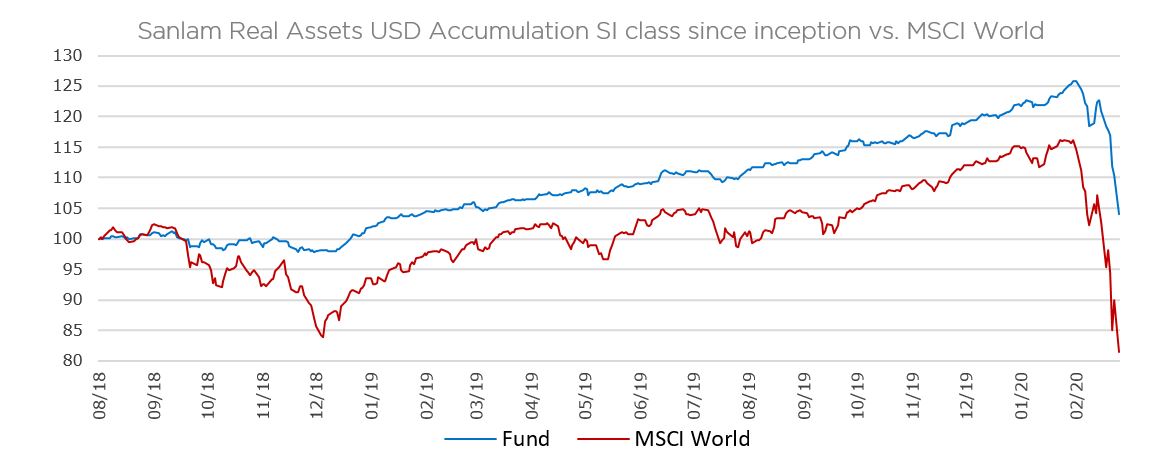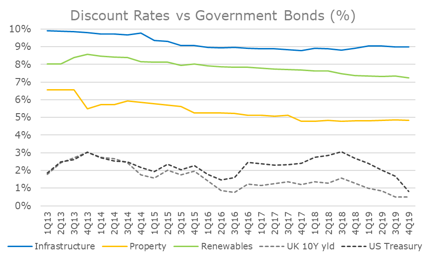by Chris Greenland, CFA, Fund Manager
Given the unfolding Covid-19 pandemic and the market pullback, this is an appropriate time to provide investors a brief update on what the Real Assets Fund has been doing. First and foremost we are pleased to see the fund behaving in the manner that is was designed to do. Given the uncertainty we feel it is important to focus on quality businesses with predictable and contractual cash flows. Whilst acknowledging that the fund has not been insulated from the downturn, the defensive nature of the asset class has been supportive over the period and the portfolio has exhibited greater capital preservation than the wider equity markets.

*View larger chart
Past performance is not a guide to future performance
The stock market pullback has come to investors with such speed and magnitude yet the discernible impact on businesses is largely unknown. What we have seen is very strong response from central banks and some governments with both monetary and fiscal stimulus. Over the coming months corporate updates and communication will shed more light on underlying business strength amidst the current environment. We are confident in the underlying long-term, predictable and contractual cash flows of our holdings.
The Real Assets Fund has an underlying portfolio yield of 5.1%. This offers a stark contrast against UK and US 10 years at 0.50% and 0.80%, and equally equity markets at 2.6% for the S&P 500 and 3.3% for the MSCI World.*
Unsurprisingly we have seen an increase in fund volatility driven by what is undoubtedly a systemic beta move. The charts illustrate the evolution of the fund’s beta and volatility against equity markets. Both systematic risk and fund volatility are still comparatively attractive.




With bond yields compressing to new lows, the case for real assets is arguably stronger. Discount rates still remain at attractive levels and risk premiums have expanded for the same low economically-sensitive assets.
*Source: Bloomberg, all data as at 16 March 2020
The Fund has holdings which are denominated in currencies other than sterling and may be affected by movements in exchange rates. Consequently the value of an investment may rise or fall in line with the exchange rates. The fund can invest in derivatives. Derivatives are used to protect against fluctuations in currencies, credit risk and interests rates or for investment purposes. There is a risk that losses could be made on derivative positions or that the counterparties could fail to complete on transactions. The Fund's expenses are charged to capital. This has the effect of increasing dividends while constraining capital appreciation. Part of the fund is invested in bonds. The government or company issuer of a bond might not be able to repay either the interest or the original loan amount and therefore default on the debt. This would affect the credit rating of the bond and, in turn, the value of the fund. Investment in bonds and other debt instruments (including related derivatives) is subject to interest rate risk. If long-term interest rates rise, the value of your shares is likely to fall. The value of this portfolio is subject to fluctuation and past performance is not necessarily a guide to future performance. The performance is calculated for the portfolio and the actual individual investor performance will differ as a result of initial fees, the actual investment date, the date of reinvestment and dividend withholding tax. All terms exclude costs. Fluctuations or movements in exchange rates may cause the value of underlying investments to go up or down. Do remember that the value of participatory interests or the investment and the income generated from them may go down as well as up and is not guaranteed, therefore, you may not get back the amount originally invested and potentially risk total loss of capital. Therefore, the Manager does not provide any guarantee either with respect to the capital or the return of a portfolio. The Yield is gross and is calculated on historic dividend income from the preceding 12 months. Since the yield is based on past information it is provided as a guide and should not be taken as a guaranteed yield. If fees are charged to the capital account then this could reduce the amount invested. Income may fluctuate in accordance with market conditions and taxation arrangements. The Manager has the right to close any Portfolios to new investors to manage them more efficiently in accordance with their mandates. Collective Investment Schemes are traded at ruling prices and can engage in borrowing and scrip lending. Collective Investment Schemes (CIS) are generally medium to long term investments. A schedule of fees and charges and maximum commissions is available on request free of charge from the Manager, the Investment Manager or at www.sanlam.ie. _SAH0320(150)0620UKInst